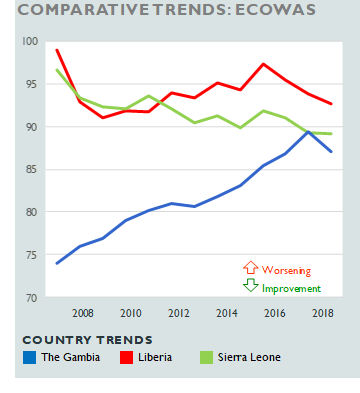BY PATRICIA TAFT AND IGNATIUS ONYEKWERE
The tiny West African nation of The Gambia, a tropical country famed for its beautiful beaches, stunning vistas, and warm hospitality, has had a turbulent few years. Ruled for over two decades by President Yahya Jammeh, The Gambia experienced a progressive slide into authoritarianism from 1994 until late 2016, when a political and military intervention spearheaded by the Economic Community of West African States (ECOWAS) succeeded in forcing Jammeh’s resignation.
During Jammeh’s 22 years in power, The Gambia experienced a sharp curtailing of basic human rights and freedoms, as well as a crackdown on independent journalism. Under Jammeh’s regime, human rights activists in the country were considered as “saboteurs,” and their offenses were punishable by death. In addition, its strategic coastal location, weak judicial system, and endemic corruption continued to make The Gambia a desirable transit point for drug traffickers operating networks between Latin America and Europe. In mid-2010, The Gambia gained notoriety not only for its authoritarian leader and draconian laws, but also as being the locale of the largest drug bust in the history of West Africa, with an estimated US$1 billion in cocaine seized from a warehouse in the northwest of the country.
 Over the past five years on the Fragile States Index (FSI), The Gambia has consistently scored poorly across indicators measuring the health of the economy, the legitimacy of the state, and human rights. It also has one of the poorest scores in the category of Human Flight, indicating that Gambians have been steadily (and, by regional comparisons, wildly disproportionately) fleeing the country in search of better livelihoods abroad, or to escape repression. Associated with this indicator, the resultant “brain drain” has had significant long-term effects across a range of other indicators, undermining political and economic development, otherwise the backbone of a stable country. Inside the country, the government stoked ethnic grievances and paranoia to cause widespread political polarization. All this combined to keep The Gambia a poor, factionalized and relatively isolated country.
Over the past five years on the Fragile States Index (FSI), The Gambia has consistently scored poorly across indicators measuring the health of the economy, the legitimacy of the state, and human rights. It also has one of the poorest scores in the category of Human Flight, indicating that Gambians have been steadily (and, by regional comparisons, wildly disproportionately) fleeing the country in search of better livelihoods abroad, or to escape repression. Associated with this indicator, the resultant “brain drain” has had significant long-term effects across a range of other indicators, undermining political and economic development, otherwise the backbone of a stable country. Inside the country, the government stoked ethnic grievances and paranoia to cause widespread political polarization. All this combined to keep The Gambia a poor, factionalized and relatively isolated country.
In a series of increasingly flawed elections, President Jammeh was returned to power four times during his tenure. In 2016, however, the tide changed, and the President faced mounting pressure from both inside and outside of the country to step down. Despite a harsh crackdown on opposition parties and opponents, Jammeh lost the December 2016 election to politician and real estate developer Adama Barrow. Jammeh initially accepted defeat, but later retracted his resignation, alleging irregularities at polling stations. This triggered sharp international condemnation, including from the African Union and ECOWAS, with the former declaring his presidency “null and void.” Behind the scenes, however, ECOWAS continued to exhaust all avenues of diplomatic pressure to get Jammeh to step down peacefully. When these efforts failed, the West African regional body acted to enforce the political transition, with an intervention known as the ECOWAS Military Intervention in The Gambia (ECOMIG), code-named “Operation Restore Democracy.” Finally, in late December, Jammeh fled to Equatorial Guinea, allegedly with US$50 million in stolen national funds, where he would be safe from transfer to the International Criminal Court.
ECOMIG represented the sixth military intervention by ECOWAS since 1990. Other interventions have taken place in Liberia, Sierra Leone, Côte d’Ivoire, Guinea Bissau and Mali. Since the regional organization’s founding in 1975, it has consistently been willing to utilize the full spectrum of political and military might of its member states to restore order in the sub-region. While some of the earlier interventions, particularly in Liberia in the early 1990s, were marred by allegations of looting and human rights abuses, the organization has nevertheless managed to distinguish itself on the continent for its willingness to intervene in potential or active humanitarian emergencies. It has also fulfilled an essential role in the provision of “bridging forces,” or the temporary deployment of military assets later to be replaced or subsumed into wider United Nations or African Union peacekeeping operations.
For The Gambia, 2017 was a transitional year which saw significant successes despite numerous challenges. In the 2018 FSI, The Gambia showed signs of slow improvement across indicators related to human rights, state legitimacy and group grievance, although these scores remained high. The Gambian economy, after decades of mismanagement and high levels of youth unemployment, continued to perform poorly. Other indicators, such as Human Flight, may be more of a long-term project, likely to take years to demonstrate any reversal in negative trends. Attracting skilled and educated Gambians to return back to the country should be a priority going forward.
Despite The Gambia’s slow recovery on the 2018 FSI, improvement was visible and all signs indicate a continuation of this trend in the foreseeable future. Within a few years of a crisis, a nation with steady leadership and economic stability can become one of the FSI’s most improved countries, as demonstrated by other countries in the sub-region, such as Sierra Leone and Liberia. In such cases, particularly in West Africa, it often helps to have a little help from friends. In the case of The Gambia, the role of regional organizations like ECOWAS in early interventions, whether political or military, is critical and should not be overlooked.